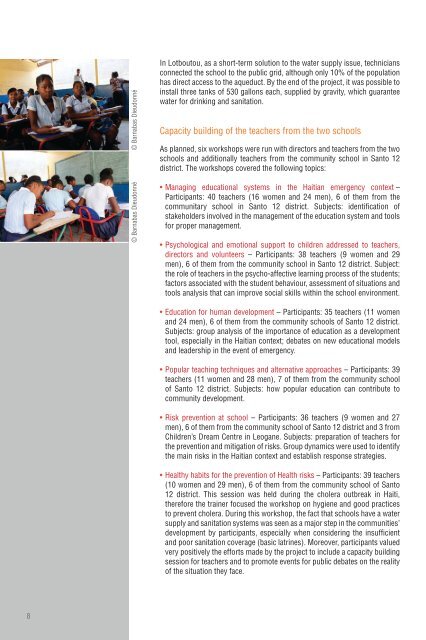In solidarity with Haiti: SOLIDAR humanitarian response to 2010 ...
In solidarity with Haiti: SOLIDAR humanitarian response to 2010 ...
In solidarity with Haiti: SOLIDAR humanitarian response to 2010 ...
Create successful ePaper yourself
Turn your PDF publications into a flip-book with our unique Google optimized e-Paper software.
© Barnabas Dieudonné © Barnabas Dieudonné<br />
<strong>In</strong> Lotbou<strong>to</strong>u, as a short-term solution <strong>to</strong> the water supply issue, technicians<br />
connected the school <strong>to</strong> the public grid, although only 10% of the population<br />
has direct access <strong>to</strong> the aqueduct. By the end of the project, it was possible <strong>to</strong><br />
install three tanks of 530 gallons each, supplied by gravity, which guarantee<br />
water for drinking and sanitation.<br />
Capacity building of the teachers from the two schools<br />
As planned, six workshops were run <strong>with</strong> direc<strong>to</strong>rs and teachers from the two<br />
schools and additionally teachers from the community school in San<strong>to</strong> 12<br />
district. The workshops covered the following <strong>to</strong>pics:<br />
• Managing educational systems in the <strong>Haiti</strong>an emergency context –<br />
Participants: 40 teachers (16 women and 24 men), 6 of them from the<br />
communitary school in San<strong>to</strong> 12 district. Subjects: identification of<br />
stakeholders involved in the management of the education system and <strong>to</strong>ols<br />
for proper management.<br />
• Psychological and emotional support <strong>to</strong> children addressed <strong>to</strong> teachers,<br />
direc<strong>to</strong>rs and volunteers – Participants: 38 teachers (9 women and 29<br />
men), 6 of them from the community school in San<strong>to</strong> 12 district. Subject:<br />
the role of teachers in the psycho-affective learning process of the students;<br />
fac<strong>to</strong>rs associated <strong>with</strong> the student behaviour, assessment of situations and<br />
<strong>to</strong>ols analysis that can improve social skills <strong>with</strong>in the school environment.<br />
• Education for human development – Participants: 35 teachers (11 women<br />
and 24 men), 6 of them from the community schools of San<strong>to</strong> 12 district.<br />
Subjects: group analysis of the importance of education as a development<br />
<strong>to</strong>ol, especially in the <strong>Haiti</strong>an context; debates on new educational models<br />
and leadership in the event of emergency.<br />
• Popular teaching techniques and alternative approaches – Participants: 39<br />
teachers (11 women and 28 men), 7 of them from the community school<br />
of San<strong>to</strong> 12 district. Subjects: how popular education can contribute <strong>to</strong><br />
community development.<br />
• Risk prevention at school – Participants: 36 teachers (9 women and 27<br />
men), 6 of them from the community school of San<strong>to</strong> 12 district and 3 from<br />
Children’s Dream Centre in Leogane. Subjects: preparation of teachers for<br />
the prevention and mitigation of risks. Group dynamics were used <strong>to</strong> identify<br />
the main risks in the <strong>Haiti</strong>an context and establish <strong>response</strong> strategies.<br />
• Healthy habits for the prevention of Health risks – Participants: 39 teachers<br />
(10 women and 29 men), 6 of them from the community school of San<strong>to</strong><br />
12 district. This session was held during the cholera outbreak in <strong>Haiti</strong>,<br />
therefore the trainer focused the workshop on hygiene and good practices<br />
<strong>to</strong> prevent cholera. During this workshop, the fact that schools have a water<br />
supply and sanitation systems was seen as a major step in the communities’<br />
development by participants, especially when considering the insufficient<br />
and poor sanitation coverage (basic latrines). Moreover, participants valued<br />
very positively the efforts made by the project <strong>to</strong> include a capacity building<br />
session for teachers and <strong>to</strong> promote events for public debates on the reality<br />
of the situation they face.

















